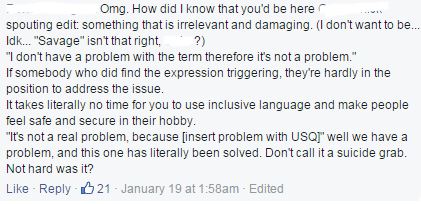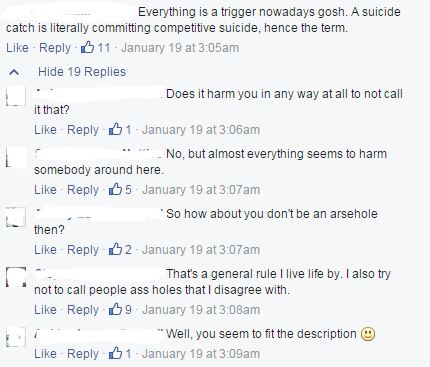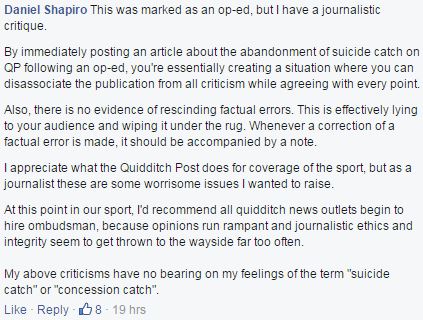- Rule, Britannia, no more?
- Unpopular Opinions: US Quadball Cup 2023
- Proven Contenders: University of Virginia
- Proven Contenders: Rutgers University
- Proven Contenders: University of Michigan
- Proven Contenders: Creighton University
- Different Perspectives: A Look Inside USA Ultimate
- Antwerp QC, Much of Belgian Core, Leaves Competitive Quidditch
Letter to the Editor: The Quidditch Zeitgeist

Credit: Paulina M. Pascual
Editor’s Note: Daniel Shapiro submitted the following column as a Letter to the Editor. Shapiro is not a member of The Eighth Man staff. He has requested we include his reasoning for submission.
“This column only resides on The Eighth Man due to my long-standing, professional working relationship with The Eighth Man Editor-in-Chief, Amanda Dallas. I applaud all of the hard work that Quidditch Post leaders Andy Marmer, Lindsay Garten and others do, as they have achieved the unfathomable goal I had back when I worked for the IQA editorial department—coverage of all quidditch, across the world.”
“Don’t ever get involved in the quidditch community online. It’ll ruin the sport for you.”
These are the words I said to a freshman on my quidditch team as we arrived to practice on Monday.
I like to imagine I am fairly visible and active in the quidditch community as a whole, and, at this point, I’m not sure that’s a good thing. Considering many of my best friendships and life experiences have come through quidditch—how did we get to this point?
Quite frankly, the quidditch community is a toxic echo chamber when it gets online.
This is in large part due to the unique nature of the sport’s communication: the Facebook network. There is a seemingly endless number of Facebook groups covering every topic; from the lighthearted discussions of mac and cheese to the serious conversations in the injury support group. I tried to discover how many groups there are, but I decided to stop my count at 100, which did not include team-specific groups.
With 100 groups, there will be plenty of cross pollination. This means that when one thread is plucked strongly enough, the entire web of the quidditch community feels it.
For those unaware, this column is in response to the kerfuffle surrounding the current debate on the existing colloquial term “suicide catch.” What the term means is that a team will purposefully catch a snitch despite being out of snitch range, effectively surrendering the game and ending its shot at victory.
Marcus Toomey, assistant coach of the Western Washington Wyverns, raised an important issue in the catch-all quidditch group, IQA: All the Regions!

Here are snippets of the conversation that followed, with names removed.

(Author’s Note: Krumming is a reference to Harry Potter character Viktor Krum, who pulled a snitch out of snitch range in Harry Potter and the Goblet of Fire.)
(Author’s Note: A voltorb is a creature in the Pokémon media franchise famous for its move “self-destruct” where it effectively removes all of its health to the point of being unconscious to drastically damage its opponent.)






I’ll spare you the rest of the conversation other than the below tidbit.

Eventually, people began to imply that those not in favor of changing the term simply do not understand because they have not dealt with suicide. And before someone begins to question whether I do: Suicide has followed me around like a storm cloud. I’ve experienced loved ones lost, failed attempts and frantically trying to reach friends that have been on that precipice where every moment can mean life or death. Suicide in its traditional meaning is a terrible, heart-wrenching topic. That is not what I’m here to address.
Returning to the discussion, both sides used verbal barbs and insults were thrown and people repeatedly took condescending tones. Before long, the quidditch zeitgeist of, “This is my stance, if you disagree with it, you’re a [insert expletive or insulting term of choice]” essentially killed any progress the sport could hope to have made. The best way to come about creating change is not through insulting those who disagree with you or act in a manner that garners your disapproval.
Thought attempts at social change in the quidditch community have often fell on deaf ears, real change in the context of sports can happen. The National Basketball Association has been running a large number of public service announcements speaking out against gun violence. You’ll hear Chicago Bulls center Joakim Noah say “we can all make a difference,” not “you’re an asshole if you disagree with me on this issue.”
What it boils down to is quidditch, especially when it comes to articles, has no critical review. It only has critical responses.
Toomey later wrote an opinion article for the Quidditch Post, one of two major quidditch news websites. The op-ed was titled “An Argument for Concession.”
It was mostly well-written and raised a number of salient points, but it had its issues that stood in the way of discussion.
“Quidditch, in its young age, has to be about growth if we are to thrive and not just survive. Growing the player base, the gameplay, the governing body, and even the ideals are all items on the to-do list of any quidditch community member.”
Ideals are a difficult thing to extrapolate to the entire playing body of quidditch. No two people will share the same ideals. This is the first issue.
Next we had a caption attached to a photo showing the University of Maryland’s seeker grabbing the snitch in the World Cup 8 Final Four against Lone Star Quidditch Club. Maryland was out of snitch range at the time and pulled the snitch to end the game.

Again, the condescending tone harms the argument. It is also worth noting that the caption initially used World Cup 8 champion University of Texas instead of LSQC, which I expand upon below.
It was immediately followed by an article posted by the Quidditch Post stating the publication will abandon the term “suicide catch.” Again, a discussion featuring plenty of insults and barbs ensued on Facebook. Rinse and repeat.
My journalism senses started tingling, so I voiced my opinion on the post in IQA: All the Regions!

I believe I’ve made my views on the current issue quite clear, but it is not strictly limited to this one instance.
Analysts are sometimes afraid to provide actual critical analysis of the sport because of backlash they receive. In such a relatively small and volatile community, this happens. Many have taken up anonymous blogs or personas, such as The Eighth Man’s writer We Breathe Quidditch, to actually provide critical analysis. This hurts the journalistic integrity of the sport as the community is effectively forcing analysts into anonymity or censoring them due to personal backlash. Any good journalist should be able to stand by what they write, but the issue here is that, unlike other sports that have such massive audiences that are often disconnected from the writers, many quidditch writers know their audience personally, making direct attacks and insults from the community much more harmful.
The other difference, of course, is that quidditch writers are volunteers. Much like head referees, berating volunteers is not the way to express disapproval or to create change—critical, calm and rational discussion is.
This is a plea to all quidditch journalists and writers: Please, use facts. Avoid generalizations. Get quotes and provide fair treatment to both sides of an argument. Listen to your audience, as hard as it can be to do sometimes.
This is a plea to the quidditch community: Stop attacking those who disagree with you. Provide constructive criticism. Stop with the name calling. Put yourselves in the shoes of the person you’re arguing against—would you want them to treat you like you’re treating them?
Sometimes this means taking the high road, which I know is easier said than done.
There is a lot to love about quidditch and where it is going, and I want to see it get there. I’m currently in the process of organizing a statewide, after-school quidditch program in Missouri. Will I be using the term “suicide catch” when teaching children about the sport?
No, because I do believe it is time to begin to use that term less.
In one of my classes, we, until recently, used the term “suicide pitch” to describe a story pitch that you knew would get shot down but existed solely to meet a story pitch quota. At the beginning of the fall semester a professor and I decided we needed a new term—our associate dean walked by and proposed “Sacrapitchal Lamb,” because we love a good play on words.
That same train of thought doesn’t work here, so with what phrase should we replace “suicide catch?” I’m a fan of forfeit catch, surrender catch and—I can’t believe this hasn’t been suggested—a losing grab.
Suicide is a serious topic that we touched on in this article. If you or a loved one are having suicidal thoughts or tendencies, please call the National Suicide Prevention Hotline at 1-800-273-8255.
Daniel Shapiro is currently a graduate student at the Missouri School of Journalism, pursuing a master’s degree in documentary journalism. He graduated in 2015 with a bachelor’s of journalism degree from the same institution. He can be contacted via twitter @DanielShapiro19 or email at DanielShapiro19@gmail.com.
Correction: The article incorrectly stated Marcus Toomey was the captain of the Western Washington Wyverns. He is the assistant coach. The change is reflected above.




2 Comments